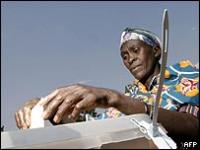







|
News and Information
Tutsi party accepts Burundi poll
| July 7, 2005 |

Burundian woman cast ballot in 4 July parliamentary election
Burundians hope the vote means the end of war
The main Tutsi party, Uprona, which governed Burundi for 30 years, has accepted the results of Monday's elections, won by former Hutu rebels.
The polls are almost the last stage in a peace process intended to end 12 years of war between Hutu rebels and the Tutsi-dominated army.
New Uprona MP Catherine Mabobori told the BBC that the polls were carried out in a "good atmosphere".
International election observers also praised the peaceful polls.
"We are confident because these people [FDD former rebels] also would not like to go back to war," Ms Mabobori told the BBC's Network Africa programme.
President Domitien Ndayizeye, whose mainly Hutu Frodebu party came second, has also accepted defeat and called on the FDD "to lead the country for the good of all Burundians".
'Democratic model'
African Union envoy Mamadou Bah told the AFP news agency that Burundi could serve as a model for other African countries trying to emerge from conflict, such as Democratic Republic of Congo, Somalia and Ivory Coast.
NATIONAL ASSEMBLY
FDD - 59 seats
Frodebu - 24 seats
Uprona - 10 seats
Others - 7 seats
"The electoral process was a success," said chief European Union election observer Alan Hutchinson.
The MPs choose a new president in August, tipped to be FDD leader Pierre Nkurunziza, an ex-university lecturer.
Some Uprona dissidents have, however, rejected the elections.
The FDD won 58%, with Frodebu coming second with 22% and Uprona third with 7%, election officials say.
The last time a Hutu won presidential elections, in 1993, the Tutsi-led army staged a coup but correspondents say this is not likely now, as African leaders would not tolerate a military takeover.
"First of all, we need to reinforce national reconciliation so that Burundians can think about a state nation, not a state ethnic group," FDD spokesperson Karenga Ramadhani told the BBC.
Correspondents say the FDD has more Tutsi officials than other mainly Hutu parties and Burundians hope this will mean they can reduce tension between the two communities.
Power shared
The FDD's biggest challenge is to bring the only remaining rebel group, the FNL into the peace process, observers say.
Patrick Smith, editor of the UK-based newsletter Africa Confidential, told Reuters news agency that some may not be happy to see former rebels leading the country.
Pierre Nkurunziza (l) with FDD fighters
Former rebel leader Pierre Nkurunziza (l) is expected to be Burundi's next leader
"Consolidating it is going to be difficult. It is one of those delicate periods a bit like Liberia or Sierra Leone where people who did heinous things in war now go into government," he said.
The BBC's Rob Walker in Bujumbura says the elections mark a fundamental shift of power in Burundi.
For much of the time since independence, control of the state has been in the hands of a narrow Tutsi elite.
Now, after a peace process lasting five years, the 100 new MPs will take their seats in an assembly, where 40% of seats are reserved for the Tutsi minority and 60% for Hutus. |
Source: www.bbc.com |
| http://news.bbc.co.uk/1/hi/world/africa/4659055.stm |
|
| Support Caprivi Freedom |
Fill out the form below to become a member of this site and receive our regular newsletter.
|

|

